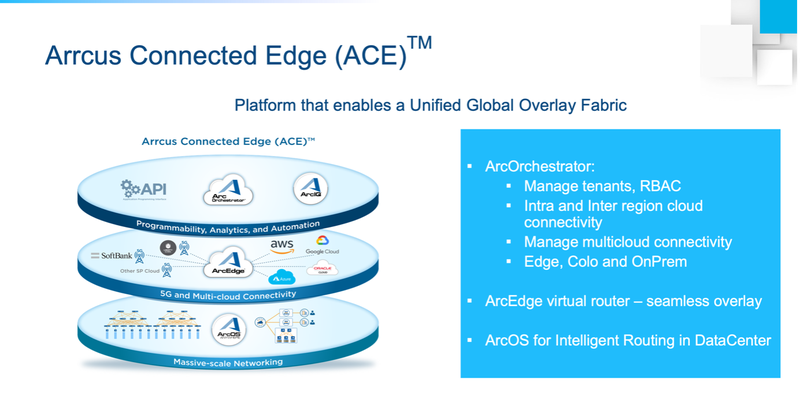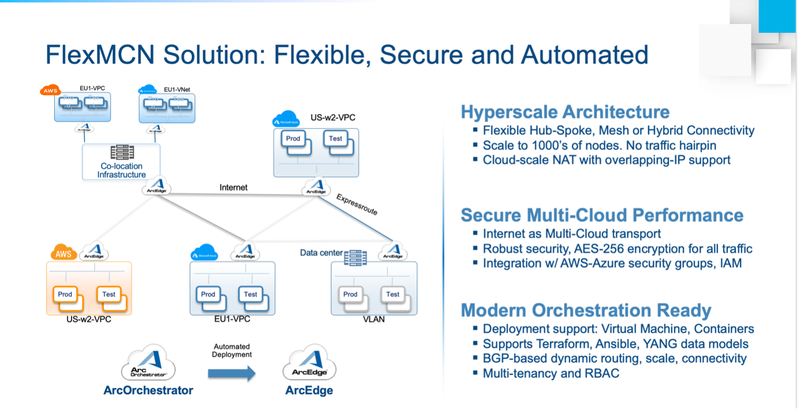Automate And Secure Multi-Cloud Connectivity With Arrcus FlexMCN
May 15, 2023 | Ashish Swaroop

A hybrid multi-cloud approach provides enterprises and service providers with more options, greater agility, and adaptability. But building, managing, and securing connections among different cloud platforms can be complex and expensive — particularly when done manually and when security is just an afterthought.
Hybrid multi-cloud: The default cloud implementation
Several enterprise organizations plan to keep their workloads on-prem while making them also integrate seamlessly with public clouds. In other words, hybrid multi-cloud will become the default implementation for these organizations. In fact, by deployment, the hybrid cloud segment is forecasted to be one of the largest contributors to the growing cloud computing market.
But as organizations adopt the hybrid multi-cloud model, key challenges emerge, including:
- Ensuring interoperability between multiple connectivity solutions that are deployed across data centers, co-location providers, telco providers, Edge, and public clouds.
- Lack of automation and programmability to support NetOps, DevOps, and life-cycle management of these point solutions
- The lack of seamless end-end security increases the attack surface area
Aside from these challenges, enterprises will also face unpredictable application performance, limited scale, and complex software lifecycle management.
To overcome these challenges and fully take advantage of a hybrid multi-cloud deployment, enterprises should leverage a flexible multi-cloud networking software (MCNS) solution that can be deployed anywhere irrespective of “place-in-network (PIN)” and one that offers an API-first management plane to automate the software lifecycle management.
The MCNS advantage
According to Gartner, “MCNS enables the design, deployment, and operation of a network in multiple public cloud environments.” It helps fill the gaps that traditional virtual routers and virtual appliances cannot fill — such as meeting the requirements of cloud and DevOps teams, particularly in programmability, integration, and flexible licensing.
Gartner says that “several thousand customers” use multi-cloud networking software and the number of customers using it will increase by 30% by year-end 2023. Enterprises deploy MCNS primarily to “address network shortcomings in the public cloud, infrastructure-as-a-service environments — including a lack of advanced features and/or consistent management at scale.”
By leveraging cutting-edge MCN software like the Arrcus FlexMCN, organizations can benefit from a secure and automated orchestration of hybrid multi-cloud connectivity. Arrcus ACE Platform is uniquely differentiated as the only platform that can be ubiquitously deployed anywhere - be it a data center, edge, co-location provider, telco, IP core, or public cloud.
Automate and secure multi-cloud connectivity with the Arrcus ACE FlexMCN
Arrcus is revolutionizing the network transport and multi-cloud networking infrastructure that traditionally includes routers and switches by bringing a disaggregated layer of software on industry-standard white-box hardware. This provides enterprises and service providers with significant cost savings in TCO. It also creates an economic value proposition for them to develop and monetize new applications on this white-box network infrastructure.
Arrcus Connected Edge (ACE)™ Platform is a software layer that provides an abstraction on white box hardware with merchant silicon. It can be deployed end to end from customer’s data centers to edge, telco, IP core, and multi-cloud environments.

ACE Platform
ACE™ Platform is a three-layered architecture. ArcOS network operating system is the foundation for this architecture. The middle layer comprises of ArcEdge for connectivity from MEC at the edge to the multi-cloud. At the top is the automation layer with programmability and streaming telemetry-based analytics, which is one of the key-value propositions Arrcus brings to the total solution. The ACE platform provides the API-based management, orchestration, and cloud-scale required by hyper-scalars and enterprises.
ArcOrchestrator allows you to orchestrate the deployment of thousands of ArcEdge nodes with standard data models and REST APIs. ArcOrchestrator is the management stack that deploys and manages the data plane software ArcEdge – the routing stack in various networks to provide data plane connectivity. ArcOrchestrator can be used to deploy ArcEdge in an on-prem data center or any public cloud.
Moreover, Arrcus’ MCN solution allows for securing multi-cloud connections between hubs and spokes. By default, all the traffic between different ArcEdges is secured with IPsec using AES 256 encryption. All traffic including the control plane, management plane, and data plane are encrypted by default.

FlexMCN Solution
The ArcOrchestrator allows you to operationally simplify ongoing management by automating and orchestrating with popular frameworks including HashiCorp Terraform, Ansible playbooks, and RestAPI. With its strong emphasis on programmability for Day 0- Day N operations, Arrcus ACE can be seamlessly integrated with a customer’s existing OSS/BSS systems or any management application. Built from the first principles for Amazon Web Services, Microsoft Azure, and Google Cloud Platform environments, the ACE multi-cloud networking platform is a fully integrated and cloud-native solution.
Conclusion
To fully take advantage of multiple cloud platforms, businesses need to orchestrate them into a single, secure network infrastructure that can be easily managed virtually.
By leveraging the ACE™ Platform, enterprise organizations will be able to automate and secure hybrid multi-cloud connectivity, reap significant cost savings in TCO, and develop and monetize new applications on this infrastructure.
ACE
multicloud
Categories
5G
ACE
AI
ArcEdge
ArcIQ
ARCOS
ARRCUS
CLOUD
datacenters
edge
FlexAlgo
hybrid
Internet
INVESTING
IPV4
IPV6
MCN
ML
multicloud
Multicloud
MUP
NETWORKING
NETWORKING INDUSTRY
Routing
SRV6
uSID